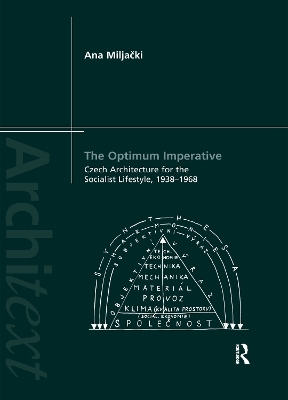
The Optimum Imperative: Czech Architecture for the Socialist Lifestyle, 1938–1968
Routledge (Verlag)
978-0-367-59542-5 (ISBN)
The Optimum Imperative examines architecture’s multiple entanglements within the problematics of Socialist lifestyle in postwar Czechoslovakia.
Situated in the period loosely bracketed by the signing of the Munich accords in 1938, which affected Czechoslovakia’s entrance into World War II, and the Warsaw Pact troops’ occupation of Prague in 1968, the book investigates three decades of Czech architecture, highlighting a diverse cast of protagonists. Key among them are the theorist and architect Karel Honzík and a small group of his colleagues in the Club for the Study of Consumption; the award-winning Czechoslovak Pavilion at the 1958 World Expo in Brussels; and SIAL, a group of architects from Liberec that emerged from the national network of Stavoprojekt offices during the reform years, only to be subsumed back into it in the wake of Czechoslovak normalization. This episodic approach enables a long view of the way that the project of constructing Socialism was made disciplinarily specific for architecture, through the constant interpretation of Socialist lifestyle, both as a narrative framework and as a historical goal.
Without sanitizing history of its absurd contortions in discourse and in daily life, the book takes as its subject the complex and dynamic relationships between Cold War politics, state power, disciplinary legitimating narratives, and Czech architects’ optimism for Socialism. It proposes that these key dimensions of practicing architecture and building Socialism were intertwined, and even commensurate at times, through the framework of Socialist lifestyle.
Ana Miljački is Associate Professor of Architecture at Massachusetts Institute of Technology, USA, where she teaches history, theory, and design. She holds a PhD (2007) in history and theory of architecture from Harvard University, USA, and her work focuses on the relationship between politics and the products and circumstances of architectural labor.
Acknowledgments
Introduction: Optimizing Optimism
Part I: Projection
Historical Introduction 1938-1948: The Socialist Prospective 1. Socialism and Lifestyle: The Intellectual Road to the Optimum Dwelling 2. Reasonable Consumption: The Necessism Group and the Rationalizing of Needs
Part II: Production Historical Introduction 1948-1958: Drawing the Curtain 3. Architecture for All: Nationalization of Czechoslovakia’s Architecture 4. All for Architecture: Determinants of Architecture and of Architectural Authors 5. One Building for All: The Czechoslovak Brussels Pavilion
Part III: Experimentation Historical Introduction 1958-1968: Reform from Within 6. An Avant-Garde for All: "Without Legends and Myths" 7. Not an Avant-Garde: The Emergence of SIAL from Stavoprojekt Liberec 8. Experiments in Free Time and Play: Liberec, circa 1966
Postscript: Turning "Máj" Into "My" Bibliography Index
| Erscheinungsdatum | 01.07.2020 |
|---|---|
| Reihe/Serie | Architext |
| Verlagsort | London |
| Sprache | englisch |
| Maße | 174 x 246 mm |
| Gewicht | 453 g |
| Themenwelt | Geschichte ► Teilgebiete der Geschichte ► Kulturgeschichte |
| Technik ► Architektur | |
| ISBN-10 | 0-367-59542-7 / 0367595427 |
| ISBN-13 | 978-0-367-59542-5 / 9780367595425 |
| Zustand | Neuware |
| Haben Sie eine Frage zum Produkt? |
aus dem Bereich


